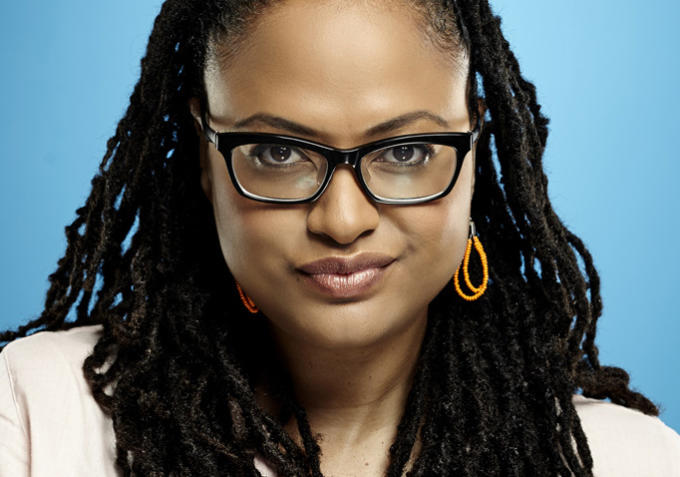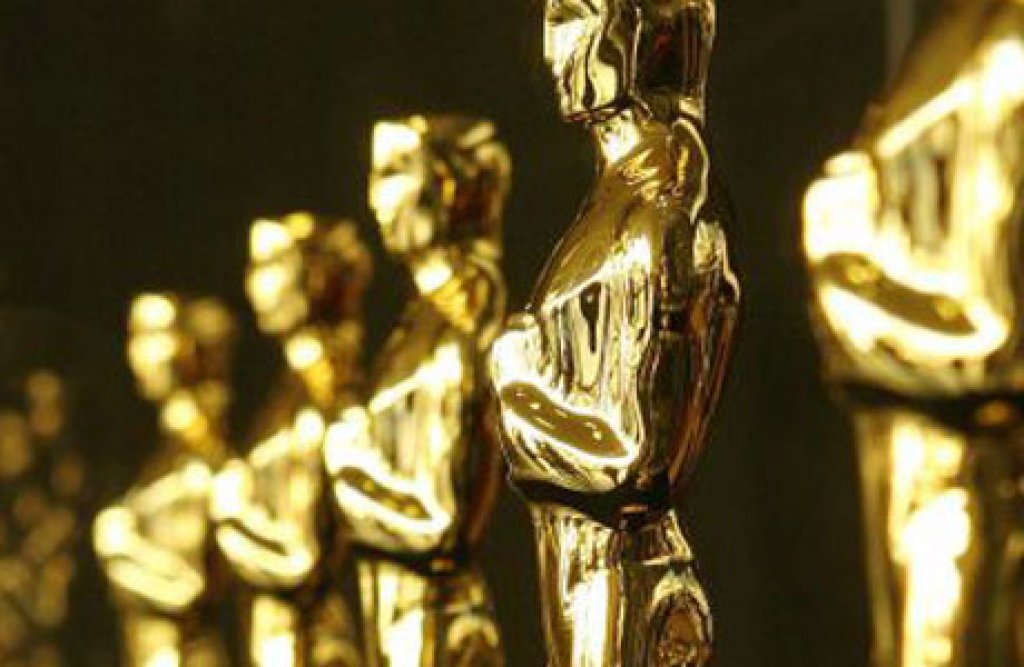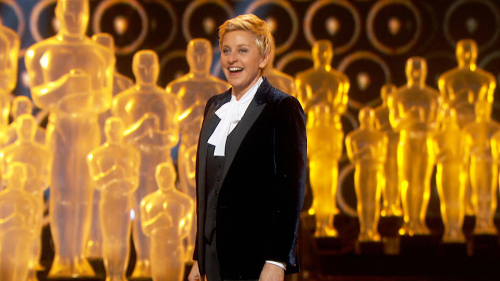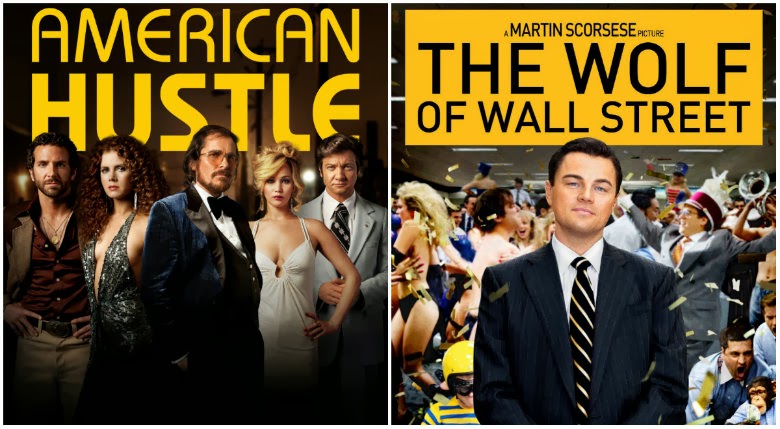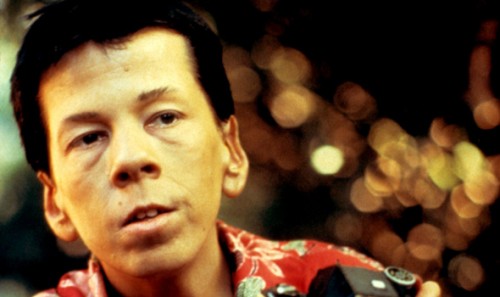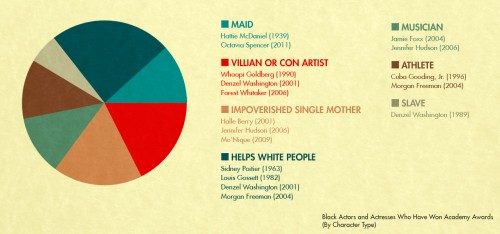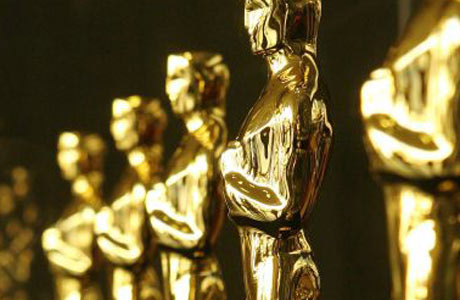Written by Brigit McCone as part of our theme week on the Academy Awards.
After seeing Selma, I’ve finally stopped yelling “Ava DuVernay was robbed! Robbed, I tell you!” long enough to jot down some thoughts. Let’s be clear: Ava DuVernay was robbed because her work on Selma turns familiar history into a gripping story, humanizes Martin Luther King Jr. while honoring his legacy, and captures the sweep of history without sacrificing the resonance of individual lives. It was inspirational history, the kind the Oscars typically reward, executed with supreme skill. Though her representation of L.B.J. was criticized, DuVernay’s characterization accurately reflected his wider shift from obstructing to supporting civil rights, while taking artistic liberties with the timeline of that shift. If Ron Howard could win Best Director for the blatantly inaccurate A Beautiful Mind, DuVernay was obviously due a nomination for Selma. Minimum.

It is because DuVernay’s work was brilliant, beyond her race and gender, that we must ask why a Black woman was snubbed. Did 12 Years A Slave‘s triumph at the 2014 Oscars influence the snubbing of Selma‘s director and actors? Recall Kathryn Bigelow’s win for Best Director in 2010. The moment Barbra Streisand stepped out to present the award, it was clear Bigelow’s name would be called. Though Bigelow’s acceptance speech never referenced being the first woman to win, Streisand’s presence shrieked, “It was time we gave it to a woman,” even as the hypermasculine Hurt Locker hardly challenged the Academy’s preference for male stories. Or recall 2001, when Denzel Washington and Halle Berry made their historic wins at the same ceremony as Sidney Poitier’s lifetime achievement award, a synchronicity that shrieked “It was time we gave it to Black performers,” threatening to overshadow Washington and Berry’s individual excellence. The Academy is not exactly subtle in framing minority wins as token gestures. If Bigelow resisted the symbolism of her win, Berry embraced it, using her speech to honor Dorothy Dandridge, Lena Horne, Diahann Carroll, Jada Pinkett, Angela Bassett, Vivica Fox, and Oprah Winfrey. Tokenism is uncomfortable, but it’s still visibility. Tokens are symbols, precedents and possibility models (as Laverne Cox might put it). If we read Oscars partly as tokens, the question arises: was Ava DuVernay snubbed because, as a Black woman, the Oscars of Steve McQueen and Kathryn Bigelow collectively represented her category?
The African American feminist Ana Julia Cooper wrote “Women versus the Indian” in 1891, criticizing white suffragettes who viewed women as a separate category, in competition with racial minorities for their rights (see also Sojourner Truth’s “Ar’nt I a Woman?”). Those who mentally isolate categories of oppression seek to maximize mainstream approval in their choice of spokesperson: the straight man of color for racial justice; the white, cis woman for feminism; the white, straight-acting gay man for LGBT causes. Each individual choice of “representative” collectively upholds the overall superiority of the straight, white male perspective (add wealthy, educated, able-bodied etc.). Because this pattern channels subversive impulses into a collective reinforcement of dominant ideology, dominant culture rewards it. One symptom is the repeated use of white women and Black men to collectively represent Black women – “the Captain Uhura snub.”
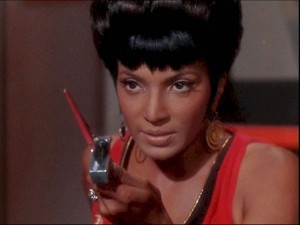
It is appropriate, when celebrating the legacy of Martin Luther King Jr., to recall Dr. King’s words to Nichelle Nichols, as she considered quitting Star Trek in frustration at the limitations of her role: “You can’t leave!… For the first time on television, we are being seen as we should be seen every day. As intelligent, quality, beautiful people … who can go into space.” Dr. King’s words show that he clearly understood the value of a token image, as a symbol, a precedent and a possibility model for future progress.
Nichelle Nichols’ Lieutenant Nyota Uhura should be an icon to every woman who is underemployed and unappreciated at work. Her mouth said, “Klingons on line one, Captain,” but her eyes said, “I should be running this place.” Within the limitations of her role, representing both token Black lieutenant and token woman, and thereby freeing a seat for another white guy, Nichols took every opportunity to demonstrate Uhura’s intelligence, charisma, courage and sex appeal. When allowed to banter with Spock, in scenes that inspired their romantic relationship in JJ Abrams’ reboot, Uhura revealed herself to be Spock’s respected intellectual equal, with the skills to man the helm, navigation and science station if needed. In combat with Mirror!Sulu, she revealed potential as an action heroine, anticipating Pam Grier (whose groundbreaking stardom in blaxploitation inspired a trend of white action heroines, instead of mainstream opportunities for Pam Grier). Uhura was cool under pressure and commanding. Though the original Star Trek‘s “Turnabout Intruder” episode claimed that women were not emotionally capable of captaincy, Uhura disproved that claim on the animated (and female-authored) “The Lorelei Signal.”
In time, society progressed and its vision of the future evolved. Dr. King’s dream of television normalizing inspirational Black leadership came true for the Trekverse, when Captain Ben Sisko of Deep Space Nine took command, combining professional skill with hands-on fathering. The aspirations of feminists paid off when Kate Mulgrew’s swashbuckling Janeway helmed Voyager. But while evolution in Star Trek‘s racial and feminist politics produced a few token promotions of Uhura’s rank, it left her marginalized supporting role unchanged. Zoe Saldana’s Uhura occupies roughly the same position in Star Trek reboots as Nichelle Nichols did on the original show. Black women can be judges, police chiefs, or politicians on our screens, at statistically disproportionate rates, but only in tokenist supporting roles that serve to discredit the reality of discrimination. When the time comes for diversity among aspirational heroes, those heroes become white women and Black men. That, in a nutshell, is the Captain Uhura snub, the intersectional finger trap of representation politics. Nichols herself aged regally and with no diminishing of spirit in the later Star Trek films, but Sisko and Janeway substitute for the unique icon that Nichols’ Captain Uhura could have been, not only as a Black woman but as a woman who paid her dues in limited and sexualized roles before showing what she was capable of. Voyager drew a sharp line between the asexual (or rather, not overtly sexualized) competence of Janeway and the spandex-clad sex-bot Seven of Nine. Captain Uhura would have straddled that line, challenging the assumed incompatibility of being a sexual object with being an aspirational hero.
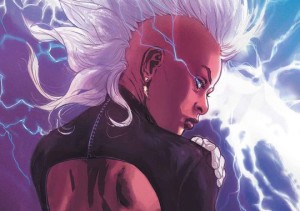
Ororo Munroe, a.k.a. Storm, is an icon. As a member of the X-Men, she fights for the rights of the mutant minority, against those who fear what they cannot understand. As an ally (and sometime wife) of Black Panther, she defends the sovereignty of Wakanda against colonial forces. Oh, and she also flies, bends the elements to her will and shoots lightning. 20th Century Fox owns the rights to X-Men, so Marvel Studios cannot be directly blamed for scheduling Captain Marvel and Black Panther to headline instead of Ororo (though they can easily be blamed for taking a decade to produce diverse superhero films). But upcoming plans to film starring vehicles for Wonder Woman and Captain Marvel have put female superheroes on the agenda. Why hasn’t this prompted 20th Century Fox to greenlight a solo outing for Wind-rider Storm, despite the rich source material of Greg Pak’s popular solo comics and the fact that the woman shoots lightning? Storm’s role in Bryan Singer’s X-Men franchise screamed “Lieutenant Uhura,” providing visible diversity while being constantly marginalized by the plot. Pak has the last word: “Storm’s the embodiment of fierce, raw power – and deep abiding empathy. She’s the most powerful woman in the Marvel Universe — incredibly exciting and elemental — even dangerous.” Movie, please.
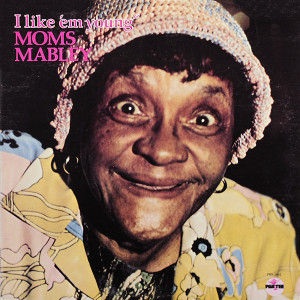
In an earlier post, I discussed evidence for regarding Loretta Mary Aiken, better known as Moms Mabley, as the pioneer of modern stand-up comedy. Evolving from vaudeville monologues, Jackie Mabley was nicknamed “Moms” because of her nurturing attitude to other performers. Her tackling of taboo topics such as race, gender, sexual double standards, poverty, and substance abuse, defined the truth-telling role we associate with the art of stand-up today. Moms herself said that everyone stole from her apart from Redd Foxx, and she was older than Redd, too.
In particular, Richard Pryor and Joan Rivers, many decades younger than Mabley, both recognized her as a major influence. In pop culture, Pryor is often hailed as the “Godfather of Comedy.” The tendency of Black comedians to recognize Pryor as the most significant pioneer of Black comedy comes at the expense of Pryor’s own acknowledged debt to Mabley, as does the tendency of feminists to cite Joan Rivers as the groundbreaking pioneer of female stand-up. Moms is often totally omitted from lists of top stand-ups, despite her claim to being the original. These choices of “representative” diminish the unique contribution of Moms Mabley, and the visibility of Black women as innovators of world culture.
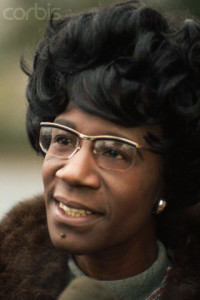
As we prepare for Barack Obama to step down from the U.S. presidency, all indicators point to the next Democratic nominee being a white woman, with Hillary Clinton and Elizabeth Warren as the frontrunners. When we celebrate womankind finally getting their shot at global leadership (Angela Merkel aside), let us take a moment to remember the candidacy of Shirley Chisholm (not to mention that Ana Julia Cooper should clearly have been running the country in the 1890s).
A founding member of the 1971 National Women’s Political Caucus, as well as the first Black congresswoman, Chisholm actively mentored an all-female staff, took political stands in favor of reproductive rights and against the Vietnam war, and fought against social exclusion on the basis of class, race and gender. Her political philosophy may be summarized by her 1972 presidential campaign slogan: “Unbought and Unbossed.” She was the first woman to win delegates for a major party nomination and the first Black candidate to run on a major party ticket. Chisholm’s voting record shows exceptional integrity and political courage, matched by the intelligence and determination to rise from a background of poverty and intersectional discriminations. Chisholm was an exemplary candidate. The fact that her career trajectory – breaking boundaries for both women and Black candidates before being snubbed for leadership – mirrors a fictional Star Trek character, hints at the power of the collective imagination to shape reality.
Change will come. After establishing her reputation with Grey’s Anatomy, which introduced a dynamic, multiracial cast behind the commercial appeal of white protagonists, Meredith Grey and Dr. McDreamy, Shonda Rhimes has created compelling, multi-faceted Black heroines (or antiheroines) who dominate Scandal and How To Get Away With Murder. Whoopi Goldberg has directed a documentary on Moms Mabley, while Shola Lynch directed one about Shirley Chisholm’s presidential bid. Last year, directors Amma Asante and Gina Prince-Bythewood offered Gugu Mbatha-Raw starring roles as fully realized protagonists. But these are all examples of Black women directors, fighting alone for better screen representations. Yes, Ava DuVernay has demonstrated talent and ambition with Selma that cannot be destroyed by a mere Oscar snub. Yes, she will probably continue to make great films until her achievements are officially recognized (am I the only one rooting for a biopic of Queen Nzinga starring Lupita Nyong’o?). But it’s high time that the “progressive” mainstream, from the Academy to Star Trek to white feminist commentators, started opening doors without waiting for them to be beaten down.
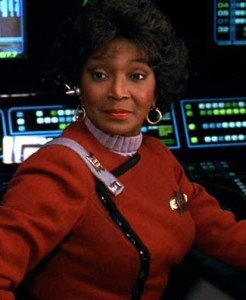
Brigit McCone reckons Ranavalona of Madagascar should be the next epic Shonda Rhimes antiheroine. She writes and directs short films and radio dramas. Her hobbies include doodling and shouting at the television on Oscar night.
